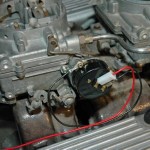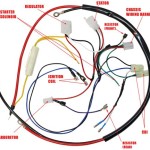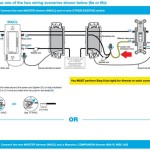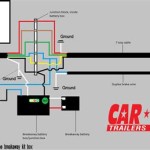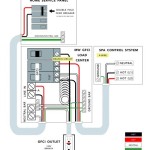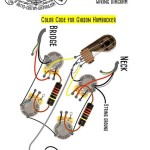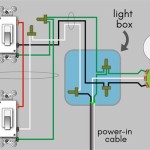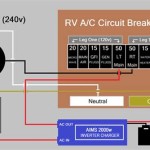Car Wiring Connectors, also known as electrical connectors, are essential components that facilitate the secure and reliable connection of electrical wires within a vehicle’s electrical system. These connectors ensure the transmission of electrical power and signals between various electronic devices and components, such as the battery, alternator, ignition system, lighting, and audio system.
The relevance of Car Wiring Connectors lies in their ability to establish and maintain proper electrical connections, preventing electrical faults, malfunctions, and potential safety hazards. Their benefits include improved electrical performance, enhanced reliability, and ease of maintenance and repair. A key historical development in the field of Car Wiring Connectors was the invention of the quick-connect terminal in the 1950s, which revolutionized electrical connections by providing a faster and more secure alternative to traditional screw terminals.
This article delves into the different types of Car Wiring Connectors, their construction, materials, and applications. It also discusses the importance of proper wiring techniques, electrical troubleshooting, and safety considerations when working with electrical connectors.
Car Wiring Connectors, also known as electrical connectors, play a crucial role in ensuring the proper functioning of a vehicle’s electrical system. They facilitate the secure and reliable connection of electrical wires, enabling the transmission of power and signals between various electronic devices and components.
- Types: Male, female, bullet, spade, etc.
- Materials: Plastic, metal, ceramic, etc.
- Sizes: Varied based on wire gauge and current capacity
- Amperage: Rated for specific current flow
- Voltage: Designed for specific voltage ranges
- Durability: Resistant to heat, moisture, and vibration
- Safety: Insulated and protected against electrical hazards
- Maintenance: Periodic inspection and cleaning ensure reliability
These aspects are crucial considerations in the design, selection, and maintenance of Car Wiring Connectors. Proper wiring techniques, including the use of appropriate connectors and tools, are essential to prevent electrical faults and ensure the optimal performance of the vehicle’s electrical system. Regular inspection and maintenance of electrical connectors can help identify and address potential issues before they lead to more significant problems.
Types
Car Wiring Connectors encompass a diverse range of types, each designed for specific applications and electrical requirements. Understanding the different types is crucial for selecting the appropriate connector for a particular electrical connection.
- Male Connectors: Featuring pins that protrude from the connector, male connectors establish the electrical connection by inserting into corresponding female connectors.
- Female Connectors: Equipped with sockets or terminals that receive the pins of male connectors, female connectors complete the electrical circuit when mated with male counterparts.
- Bullet Connectors: Compact and cylindrical in shape, bullet connectors are commonly used for quick and temporary electrical connections, often in automotive and audio applications.
- Spade Connectors: Featuring a flat, spade-shaped terminal, spade connectors are designed for secure and reliable electrical connections in high-current applications, such as battery terminals and starter motors.
The selection of the appropriate connector type depends on factors such as the wire gauge, amperage, voltage rating, and environmental conditions. Proper mating of male and female connectors ensures a secure and reliable electrical connection, minimizing the risk of electrical faults and malfunctions.
Materials
The materials used in the construction of Car Wiring Connectors play a critical role in determining their performance, durability, and suitability for specific applications. The most common materials employed in Car Wiring Connectors include plastic, metal, and ceramic, each offering unique properties and advantages.
Plastic is widely used in Car Wiring Connectors due to its lightweight, affordability, and ease of molding. Plastic connectors are often used for low-current applications, such as interior lighting and audio systems. Metal connectors, on the other hand, are more robust and durable, providing better electrical conductivity and resistance to heat and vibration. Metal connectors are commonly used in high-current applications, such as starter motors and battery terminals. Ceramic connectors offer excellent insulation properties and are often used in high-voltage applications, such as spark plugs and ignition systems.
The selection of the appropriate material for Car Wiring Connectors depends on several factors, including the electrical requirements of the application, environmental conditions, and cost considerations. By understanding the properties and limitations of different materials, engineers and technicians can select the optimal connectors for each application, ensuring reliable electrical connections and minimizing the risk of electrical faults.
Sizes
Within the realm of Car Wiring Connectors, the aspect of “Sizes: Varied based on wire gauge and current capacity” holds significant importance in ensuring proper electrical connections and preventing malfunctions. This variability caters to the diverse electrical requirements of different components and circuits within a vehicle’s electrical system.
- Wire Gauge: Measured in American Wire Gauge (AWG), wire gauge determines the thickness and current-carrying capacity of a wire. Thicker wires with lower AWG numbers can handle higher currents, while thinner wires with higher AWG numbers are suitable for lower currents.
- Current Capacity: The maximum amount of electrical current that a Car Wiring Connector can safely handle is referred to as its current capacity. This capacity depends on the size and material of the connector, and it must be carefully matched to the current requirements of the circuit it is intended for.
- Connector Size: The physical size of a Car Wiring Connector is directly related to its current capacity. Larger connectors are typically designed for higher current applications, while smaller connectors are suitable for lower current applications.
- Electrical Resistance: The size of a Car Wiring Connector also influences its electrical resistance. Smaller connectors have higher resistance due to their reduced cross-sectional area, which can lead to voltage drop and power loss in high-current applications.
Understanding the relationship between wire gauge, current capacity, and connector size is crucial for selecting the appropriate Car Wiring Connectors for each application. Proper sizing ensures optimal electrical performance, prevents overheating and damage to the connectors, and minimizes the risk of electrical faults.
Amperage
In the context of Car Wiring Connectors, “Amperage: Rated for specific current flow” refers to the maximum amount of electrical current that a connector can safely handle. This rating is crucial for ensuring proper electrical connections, preventing overheating, and safeguarding the electrical system from potential damage.
The amperage rating of a Car Wiring Connector is determined by its design, materials, and construction. Factors such as the size and thickness of the conductors, the type of terminals used, and the overall insulation play a role in determining the current-carrying capacity of the connector. It is essential to match the amperage rating of the connector to the current requirements of the circuit it is intended for.
Using a Car Wiring Connector with an insufficient amperage rating can lead to several issues. Overheating is a common problem, as excessive current flow can cause the connector to heat up, potentially damaging the connector and surrounding components. In severe cases, overheating can even lead to electrical fires. Additionally, an undersized connector can experience increased electrical resistance, resulting in voltage drop and reduced power transmission efficiency.
Understanding the amperage rating of Car Wiring Connectors is essential for proper electrical system design and maintenance. By selecting connectors with appropriate amperage ratings, engineers and technicians can ensure reliable electrical connections, prevent overheating and damage, and maintain optimal electrical performance in automotive applications.
Voltage
In the realm of Car Wiring Connectors, “Voltage: Designed for specific voltage ranges” plays a critical role in ensuring the safe and efficient operation of a vehicle’s electrical system. Voltage, measured in volts, represents the electrical potential difference between two points in a circuit. Car Wiring Connectors must be designed to withstand and transmit the specific voltage levels present in the electrical system, which can vary depending on the application and vehicle.
The voltage rating of a Car Wiring Connector is determined by its design, materials, and construction. Factors such as the insulation thickness, conductor size, and terminal design influence the connector’s ability to handle different voltage levels. Using a connector with an insufficient voltage rating can lead to electrical arcing, insulation breakdown, and potential safety hazards.
Real-life examples of “Voltage: Designed for specific voltage ranges” in Car Wiring Connectors include:
- Low-voltage connectors: Used in circuits with voltage levels below 50 volts, such as interior lighting and audio systems.
- High-voltage connectors: Designed for circuits with voltage levels exceeding 50 volts, such as the ignition system and battery connections.
Understanding the voltage ratings of Car Wiring Connectors is essential for proper electrical system design and maintenance. By selecting connectors with appropriate voltage ratings, engineers and technicians can ensure reliable electrical connections, prevent electrical faults, and maintain optimal performance in automotive applications.
Durability
In the realm of automotive electrical systems, “Durability: Resistant to heat, moisture, and vibration” stands as a critical attribute of Car Wiring Connectors, ensuring their reliable performance in harsh operating environments. This durability is achieved through careful design and the use of robust materials, enabling these connectors to withstand the rigors of real-world automotive applications.
Heat resistance is paramount, as Car Wiring Connectors are subjected to elevated temperatures generated by engine operation and other electrical components. Heat can degrade insulation materials and solder joints, leading to electrical faults and malfunctions. Durable connectors employ heat-resistant materials, such as high-temperature plastics and ceramics, to maintain their integrity and functionality even in extreme heat.
Moisture resistance is equally important, as vehicles often encounter wet and humid conditions. Moisture ingress can cause corrosion, short circuits, and insulation breakdown. Durable connectors incorporate moisture-resistant seals and gaskets to prevent water intrusion, ensuring reliable electrical connections even in harsh weather.
Vibration resistance is essential due to the constant vibrations experienced in automotive environments. Loose or damaged connectors can disrupt electrical signals and lead to intermittent faults. Durable connectors employ robust mechanical designs, such as locking mechanisms and vibration-dampening materials, to maintain secure connections and prevent electrical disruptions.
Real-life examples of “Durability: Resistant to heat, moisture, and vibration” in Car Wiring Connectors include:
- Under-hood connectors: These connectors are exposed to extreme heat, moisture, and vibration from the engine and other components.
- Exterior lighting connectors: These connectors must withstand exposure to moisture, road salt, and vibration while maintaining reliable electrical connections.
- Battery terminals: These connectors handle high currents and must be resistant to corrosion and vibration.
Understanding the importance of “Durability: Resistant to heat, moisture, and vibration” in Car Wiring Connectors enables engineers and technicians to select and use connectors that meet the specific requirements of each application. By ensuring the durability of electrical connections, they can prevent electrical faults, improve system reliability, and enhance overall vehicle safety and performance.
Safety
In the realm of automotive electrical systems, “Safety: Insulated and protected against electrical hazards” is a crucial aspect of Car Wiring Connectors, ensuring the prevention of electrical shocks, short circuits, and fires. This safety is achieved through various design features and materials, safeguarding both the electrical system and individuals working on or around vehicles.
- Insulated Terminals: Each terminal within a Car Wiring Connector is covered with a non-conductive material, such as plastic or rubber, preventing accidental contact with live electrical components.
- Enclosed Housings: The connectors themselves are enclosed in durable plastic or metal housings, providing a protective barrier against external elements and preventing accidental contact with energized terminals.
- Strain Relief: Car Wiring Connectors incorporate strain relief mechanisms, such as molded rubber boots or flexible conduits, to prevent excessive bending or pulling on the wires, which could compromise the integrity of the connection and increase the risk of electrical hazards.
- Polarized Connectors: Many Car Wiring Connectors are designed with polarized terminals, ensuring proper alignment and preventing incorrect connections that could lead to short circuits or damage to electrical components.
By adhering to strict safety standards and employing these design features, Car Wiring Connectors play a vital role in maintaining a safe and reliable electrical system in vehicles. They prevent electrical accidents, protect against electrical fires, and safeguard individuals from potential electrical hazards, ensuring the safe operation and maintenance of automotive electrical systems.
Maintenance
In the context of Car Wiring Connectors, “Maintenance: Periodic inspection and cleaning ensure reliability” holds immense significance. Regular maintenance practices are crucial for preserving the integrity and functionality of these connectors, which play a vital role in the proper functioning of a vehicle’s electrical system.
Periodic inspection involves visually examining the connectors for signs of damage, corrosion, or loose connections. This proactive approach enables the early detection of potential issues, preventing minor problems from escalating into major electrical faults. Cleaning, on the other hand, involves removing dirt, debris, and moisture that can accumulate over time. Contaminants can impair electrical conductivity and increase the risk of shorts or malfunctions.
Real-life examples of “Maintenance: Periodic inspection and cleaning ensure reliability” in Car Wiring Connectors include:
- Inspecting and cleaning battery terminals to prevent corrosion and ensure proper electrical contact.
- Checking and cleaning electrical connectors under the hood, particularly in areas exposed to moisture and heat.
- Examining and cleaning trailer wiring connectors to ensure reliable connections between vehicles.
Understanding the importance of “Maintenance: Periodic inspection and cleaning ensure reliability” empowers individuals to proactively maintain their vehicles’ electrical systems. Regular maintenance helps prevent electrical problems, extends the lifespan of Car Wiring Connectors, and contributes to the overall safety and reliability of the vehicle.










Related Posts

